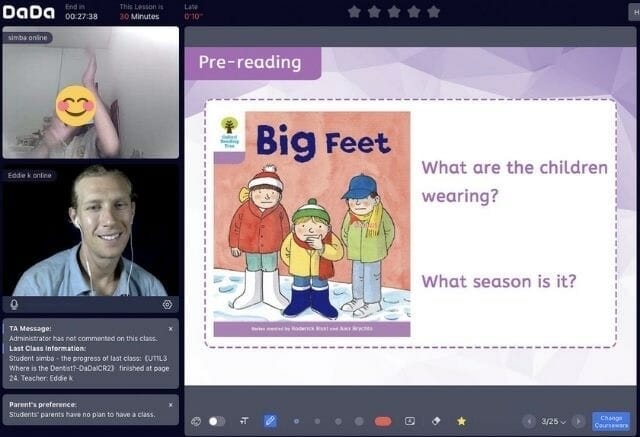There’s good and bad to everything, and working as an online English teacher is no exception. Read on for an ultimate list of the pros and cons of teaching English online.
When I started teaching English in 2019, I was super excited about the prospect of making money online. I had just finished my contract teaching in Korea and was ready to hit the road and start a new adventure.
And while I found teaching English online to be an excellent way to supplement my income, it’s not all sunshine and rainbows. So now that it’s been a bit since I jumped aboard the online teaching wagon, I thought I’d share my honest thoughts on working as an online English teacher.
Here are my personal pros and cons of teaching English online, as well as some helpful tidbits to help you start your journey.
Read more: Best Companies to Teach English Online
This post may contain affiliate links, meaning at no additional cost to you, if you click my links and make a purchase, I may earn a small commission. Learn more on my disclosure page. Thank you for your support!

What is online English teaching?
Teaching English online is an excellent job opportunity that connects English speakers with students seeking to learn English. It’s grown in popularity over the past few years, and there’s still a seemingly never-ending high demand for teachers.
Teachers work from home or remotely as independent contractors and typically need only a stable WiFi connection, a phone or computer, and headphones with a microphone to get started. Lessons are usually conducted in half-hour increments – but some programs have longer classes – and taught one to one or in a small grouping of students no more than 3 or 4.
Who are the students?
As an online English teacher, the highest demand lies with teaching young students in Asia, predominately in Japan and Korea. However, some companies also connect English teachers with adult learners or students from other countries around the world.
It’s worth noting that recent changes in China have drastically changed the online tutoring English industry. China once held a massive corner of the market, and was where native speakers could find the best and most online job opportunities. However, as of July 2021, new laws in China have banned the employment of foreign based teachers in its education industry, effectively putting out Chinese-based tutoring companies.
I’ve complied updated lists of the best companies to teach English outside of China here:
- Best Places to Teach English Online to Korean Students
- Best Places Platforms to Teach English Online to Japanese Students
What are the English teaching job requirements?
Every teaching platform has their own set of requirements, but in general, to be hired as an English teacher, you’ll need:
- To be a native English speaker or proof of native level ability
- Citizen of specific countries like US, UK, Canada, Australia, Ireland, New Zealand, and South Africa (for some companies)
- A college degree
- A reputable TEFL certificate
Not all platforms make these requirements mandatory, except a TEFL certificate is always a requirement. A TEFL is the most important thing all aspiring English teachers need in order to secure an ESL job online or abroad. And of course passing the interview.
But the other requirements are a little more flexible. If you don’t have a degree, don’t fret! There are many companies that hire English teachers without degrees. PalFish is a great example.
If you’re a non-native English speaker seeking a job, it can be a little tricky. But some places do hire non-native English teachers.
Best Places to Teach English Online
Here’s a quick summary of some of the best companies to teach English online:
- Cambly is an excellent platform for first-time online English teachers. They have low entry requirements (just need to be a native speaker, no TEFL or degree required) and have two programs so teachers can work with both adults and children. Pay is between $10.20-$12/hour.
- EF Education First hires English teachers to teach online and makes it possible to earn an income on your own time. Teachers must have a degree and be willing to get a TEFL certificate as part of the training process if you don’t already have one.
- Lingoda is a platform where native-speakers can tutor students in English in other foreign languages. You must have at least a C2 certificate in the language you wish to teach, a certificate to teach that language (like a TEFL), and previous experience.
How and where to get a TEFL certificate?
A TEFL certificate is an essential qualification teachers need to get hired as an online English teacher. You should aim for at least a 120-hour TEFL certificate, which is the common industry standard for training.
Most certificates can be completed online on your own time, in 1-3 months, and can cost anywhere from $200 – $2,500+.
My go-to recommendation for aspiring teachers is The International TEFL Academy. The International TEFL Academy is a higher end provider that’s consistently touted as the #1 TEFL in the industry, but they are pricey.
That’s why I also recommend the TEFL courses at iTTT because they’re super reasonably priced, accredited, trustworthy, and convenient for those looking for a budget-friendly TEFL.
And I have a 20% discount for new students at iTTT who apply via my unique link to save you even more coin.
An Ultimate List of the Pros and Cons of Teaching English Online
Here’s a breakdown of the advantages and disadvantages of teaching English online.
8 Advantages of Teaching English Online
Let’s start with the good! Here are some of the perks of teaching English online that I’ve come to enjoy and appreciate. This is what makes it all worth it.
1. Enjoy the freedom to make your own schedule
One of the best aspects of this gig is that you get to set your own schedule. Some companies ask for a minimum amount of work hours each week or month, but ultimately you’re free to pick the days and times that work for you. Classes are typically only 25-30 minutes, making for a fast-paced and interesting day with many different students.
2. You can earn a decent income of $10-$20+/hour
The best teaching platforms pay teachers up to $20+ per hour! That ain’t too shabby for posting up in front of a computer screen and chatting with students. It’s worth noting that the pay structure for teaching online is a bit weird.
Teachers usually make a base hourly rate and then earn little “bonuses” based on your attendance, how often you teach, and how well you sell courses to students. So this rate can vary wildly (thus the $10 – $20 range!).
3. There are also referral bonus opportunities
As mentioned above, another job perk is that some online English teachers enjoy is referral bonuses. Not every company offers this perk, but if they do, it essentially means you earn a small bonus between $20-$50+ every time you successfully recruit a new teacher or student to the program.
At Cambly, for example, teachers make about $30 for every new teacher that uses their referral link (who passes the interview). If you’re great at selling, this can add up quickly to a nice chunk of change each month!
4. Teach from home or on the road
Teaching English online affords a lot of flexibility for teachers! It’s an excellent opportunity for aspiring digital nomads looking to get some footing in the world of earning money online. It’s also perfect for those who wish to stay home with kids or need to stay home for other reasons.

5. You don’t need much to get started
Teaching often requires an immense amount of costly resources; however, as an online teacher, you don’t need a classroom full of toys or technology to teach. You just need a stable WiFi connection, a smartphone or computer, and headphones with a mic.
A quiet place to teach is also a must, and it’s a bonus if you can put up an appealing background for your students (think world map and your name in clip art).
6. Some online ESL jobs provide teachers with lesson material
What I loved most about being an online ESL teacher is that I didn’t have to do any lesson planning. None! Many companies will plan and provide lesson material and slides for you before every class.
For the company, this ensures they maintain the same standards for all students across all teachers. For the teachers, this means you never have to give your teaching a second thought outside of your actual scheduled teaching hours. No extra work!
7. No teaching experience required
If you’ve been wondering how to teach English online as someone without any experience, it’s not a problem. Most platforms don’t require any teaching experience, prioritizing your native English speaking ability and TEFL certificate.
But if you have any experience working with kids, it can help you be more competitive on your application and attract new students.
8. It’s fun and easy
If you enjoy working with kids, it’s genuinely such an easy and fun job! You just sit in front of a screen, teach how to say the target phrases and words already provided for you, and fill out a little performance evaluation after class. Just remember that kids are kids, and they’re not perfect angels all the time.

8 Disadvantages of Teaching English Online
As many positives as there are, there are also quite a few cons or challenges of teaching English online that every curious teacher should be aware of.
1. Many companies require a college degree and a TEFL
The highest paying companies require a college degree, usually a bachelor’s. But as I mentioned above, if you don’t have a degree, it’s not impossible to find opportunities. There are just fewer options, unfortunately.
Another key requirement that’s pretty standard across the board is a TEFL certificate, which tends to be more important than a college degree. Luckily, there are many options for a cheap TEFL certificate for those short on money, and it’s possible to find an all online course that can fit into busy schedules and be completed on your own time.
2. It can be difficult to earn a full-time income
If you have aspirations to replace a full-time income with teaching English online, it can be really challenging. It takes a lot of elbow grease to market yourself to attract regular students and hustling to refer other teachers and students.
Many bloggers online love announcing that they make upwards of $2,000-$3,000 a month teaching online, and they’re honestly the exception, not the rule. Not saying it’s impossible, just saying it takes time and a lot of hard work to get to that level. I personally have never made more than $500 a month teaching online, but I’ve always used it just as a way to earn an additional income part-time.
3. Finding students takes time
This brings me to my next point, finding regular students takes time. You don’t start and immediately have a full schedule of bookings.
You get students and bookings by marketing yourself on the platform via posts or live lessons, networking and connecting with students and other teachers, and nailing trial lessons with prospective students. Trials are free lessons for students that aren’t paying customers yet, but considering the service (don’t worry, you get paid).

4. Time differences can make teaching online difficult
This is an essential consideration for those with hopes to go full time. Because most online teaching caters to students in Asia, the time difference can be an impediment, especially if you live in North America. Teachers need to be available on their students’ desired time.
Peak teaching hours in Asia are after school hours and all day on the weekends, or about 4pm – 9pm Beijing time and 9am – 9pm Beijing time. These times translate to super early morning hours in the states (about 2am – 9pm CT weekdays / 7pm – 7am CT weekends) and afternoons in Europe.
5. The lesson material can be boring OR planning lessons can be time consuming.
This is a two-part disadvantage. As mentioned, some companies provide teachers with lesson plan materials As much as not having to plan lessons is a pro, that does mean that you don’t have any control over what you’re teaching. Many find that provided lesson materials for online teaching can become quite dull and repetitive over time, especially if you have to teach trial lessons.
On the other hand, some companies require teachers to prepare their own lesson materials. This is a pro in the sense that you have total control and are free to change up materials, but also means that you’ll be responsible for working outside of the time spent teaching, time that is technically unpaid.
6. You don’t receive any benefits
When you teach online, you’re regarded as an independent contractor. That means no benefits like insurance, and that also means you’re solely responsible for setting aside the appropriate amount of taxes and paying it all back at the end of the year. If you’re American, depending on how much you earn, you may also be required to pay estimated quarterly taxes.
It’s also worth mentioning that teachers often have to complete small training videos or unpaid tasks. There’s also no job protection, and your employment is entirely at the will of the company.
7. Companies see you predominantly as a salesperson and an entertainer
Online ESL teachers are not traditional teachers. You’re more of an educational entertainer trying to keep students (and sometimes parents) happy. You’re also a salesperson for the company, one who’s always trying to convince students to pay for services and striving to recruit teachers.
These companies also don’t always appreciate their teachers in the ways that they should. Because there are many seeking a job teaching online, that means vacancies are easy to fill when a teacher leaves. I’ve noticed over two years teaching online, they’ve slowly taken away perks, and I think it’s because they know they will always be able to find new teachers.
8. It can get repetitive, and there’s a high turnover of students
As mentioned above, teaching online is not a traditional teaching role. You don’t always have a group of regular students, which means you don’t get a chance to develop a good relationship with anyone or see them continuously progress.
However, with time, you’ll start attracting regulars, but it doesn’t compare to having a classroom full of the same students for an entire year. At one point, I did have five regulars I’d see each week, which was nice. Otherwise, they were trials or random bookings.

Is teaching English online worth it?
I’d be lying if I said that all days are great days. It can be hard to find the energy to be constantly cheerful, and it can be a challenge keeping kids focused when trying to teach them a new language through a screen.
But when I consider the advantages and disadvantages of teaching English online, I’d say it’s totally worth it in my personal experience. It provided me with the supplemental income I needed when I was in a tough spot trying to get my freelance writing off the ground. But it’s helpful setting expectations that this job isn’t a “normal” teaching gig.
And it’s truly a super easy way to earn money online and even contribute to your travel savings if you’re using it to make pocket money.
Have these pros and cons of teaching English online helped you decide to take the plunge? Let me know in the comments!






Very informative article. Thank you for giving a honest opinion.
This was helpful. Knowing myself, I’d rather work with young adults/adults. It seems like the market is predominantly for younger learners (children). Did I get that right? Thank you in advance. Cheers!
Hi Sadie! Thank you for your comment 🙂 I’d say that it depends on the region (many Asian companies cater towards children for example). But there are also many opportunities to teach adults if that’s your preference!! Good luck!
Hei!
Thanks for the comprehensive article.
I’m neither a native English speaker nor have a degree in teaching (but i have a master’s degree and aquired it in English). I’m planning to get a TEFL certificate to work as a part-time online English teacher. Do you think I have any chances?
Since the target audience is from Asian countries mostly (based on what you said), isn’t not being familiar with their native language a hassle?
And also, how long does it take to have a job on a stable basis?
I appreciate your comments. I want to make sure the path I’m taking is worthy of the time and money I’m spending on.
Wish you all the best 🌹
Hi Zahra! Thanks for your comment! If you’re not a native speaker but have test scores or some proof of high English ability, you may have a chance, however some companies can be pretty strict. I recommend looking into the requirements for companies that hire non-native speakers to get a better idea. You may even want to consider applying to some of these roles now, before investing more time and money to see if your application is considered and to get started. Unfortunately I’m a native English speaker so I can’t speak on personal experience.
About not speaking your students’ native language, it can be a hassle at times but usually it’s not a problem. Many online classes have a frame work and you learn how to utilize TPR, props, hand motions etc to help when stuck. It’s also usually only a hassle with really young students who have zero basis or are fidgety.
In full transparency, it can be difficult to earn a full time income teaching English online, and companies more often than not do not offer teachers benefits. If you wish to make teaching English a career, doing so online may be a better option part time or for extra pocket money on the side of teaching somewhere in person. It’s not impossible, but I don’t want to mislead anyone! It can take time to build a student base and requires some hustle and grind.
As for companies that hire non native speakers, check out this list as a starting point: https://www.internationalteflacademy.com/blog/8-companies-that-hire-non-native-speakers-to-teach-english-online
Hope this helps!